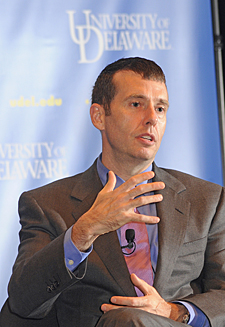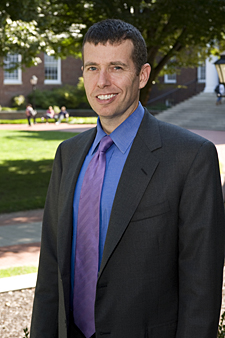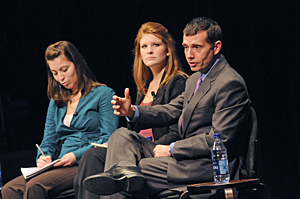
ADVERTISEMENT
- Rozovsky wins prestigious NSF Early Career Award
- UD students meet alumni, experience 'closing bell' at NYSE
- Newark Police seek assistance in identifying suspects in robbery
- Rivlin says bipartisan budget action, stronger budget rules key to reversing debt
- Stink bugs shouldn't pose problem until late summer
- Gao to honor Placido Domingo in Washington performance
- Adopt-A-Highway project keeps Lewes road clean
- WVUD's Radiothon fundraiser runs April 1-10
- W.D. Snodgrass Symposium to honor Pulitzer winner
- New guide helps cancer patients manage symptoms
- UD in the News, March 25, 2011
- For the Record, March 25, 2011
- Public opinion expert discusses world views of U.S. in Global Agenda series
- Congressional delegation, dean laud Center for Community Research and Service program
- Center for Political Communication sets symposium on politics, entertainment
- Students work to raise funds, awareness of domestic violence
- Equestrian team wins regional championship in Western riding
- Markell, Harker stress importance of agriculture to Delaware's economy
- Carol A. Ammon MBA Case Competition winners announced
- Prof presents blood-clotting studies at Gordon Research Conference
- Sexual Assault Awareness Month events, programs announced
- Stay connected with Sea Grant, CEOE e-newsletter
- A message to UD regarding the tragedy in Japan
- More News >>
- March 31-May 14: REP stages Neil Simon's 'The Good Doctor'
- April 2: Newark plans annual 'wine and dine'
- April 5: Expert perspective on U.S. health care
- April 5: Comedian Ace Guillen to visit Scrounge
- April 6, May 4: School of Nursing sponsors research lecture series
- April 6-May 4: Confucius Institute presents Chinese Film Series on Wednesdays
- April 6: IPCC's Pachauri to discuss sustainable development in DENIN Dialogue Series
- April 7: 'WVUDstock' radiothon concert announced
- April 8: English Language Institute presents 'Arts in Translation'
- April 9: Green and Healthy Living Expo planned at The Bob
- April 9: Center for Political Communication to host Onion editor
- April 10: Alumni Easter Egg-stravaganza planned
- April 11: CDS session to focus on visual assistive technologies
- April 12: T.J. Stiles to speak at UDLA annual dinner
- April 15, 16: Annual UD push lawnmower tune-up scheduled
- April 15, 16: Master Players series presents iMusic 4, China Magpie
- April 15, 16: Delaware Symphony, UD chorus to perform Mahler work
- April 18: Former NFL Coach Bill Cowher featured in UD Speaks
- April 21-24: Sesame Street Live brings Elmo and friends to The Bob
- April 30: Save the date for Ag Day 2011 at UD
- April 30: Symposium to consider 'Frontiers at the Chemistry-Biology Interface'
- April 30-May 1: Relay for Life set at Delaware Field House
- May 4: Delaware Membrane Protein Symposium announced
- May 5: Northwestern University's Leon Keer to deliver Kerr lecture
- May 7: Women's volleyball team to host second annual Spring Fling
- Through May 3: SPPA announces speakers for 10th annual lecture series
- Through May 4: Global Agenda sees U.S. through others' eyes; World Bank president to speak
- Through May 4: 'Research on Race, Ethnicity, Culture' topic of series
- Through May 9: Black American Studies announces lecture series
- Through May 11: 'Challenges in Jewish Culture' lecture series announced
- Through May 11: Area Studies research featured in speaker series
- Through June 5: 'Andy Warhol: Behind the Camera' on view in Old College Gallery
- Through July 15: 'Bodyscapes' on view at Mechanical Hall Gallery
- More What's Happening >>
- UD calendar >>
- Middle States evaluation team on campus April 5
- Phipps named HR Liaison of the Quarter
- Senior wins iPad for participating in assessment study
- April 19: Procurement Services schedules information sessions
- UD Bookstore announces spring break hours
- HealthyU Wellness Program encourages employees to 'Step into Spring'
- April 8-29: Faculty roundtable series considers student engagement
- GRE is changing; learn more at April 15 info session
- April 30: UD Evening with Blue Rocks set for employees
- Morris Library to be open 24/7 during final exams
- More Campus FYI >>
3:12 p.m., Oct. 22, 2009----David Plouffe, a key leader in the 2008 Democratic campaign of President Barack Obama and a University of Delaware alumnus, reflected on his experiences on the campaign trail and shared some thoughts on the Obama presidency so far during a presentation Wednesday, Oct. 21, in front of students, faculty and community members at the University of Delaware's Mitchell Hall.
Plouffe's appearance was a part of UD's fall public affairs lecture series, “Assessing Obama's First Year,” sponsored by the departments of Communication and Political Science and International Relations, the Office of the Provost, the College of Arts and Sciences and the School of Urban Affairs and Public Policy.
The presentation was simulcast around the world through Second Life technology and is available at UD Podcasts.
Reflections on the campaign
One key advantage to Obama's successful campaign, Plouffe said, was Obama's tone throughout the campaign. “His tone is a little bit different than most political figures,” he said. “I think people wanted to have a serious election. Voters wanted to be treated like adults and I think he did that and does that.”
Plouffe said that the Obama campaign used unique media tactics during the election season that took advantage of Obama's tone. While Republican John McCain was hitting people with a “fusillade of negative ads,” he said the Obama campaign ran a series of two-minute commercials in which Obama was shown on the screen sitting in a chair and discussing issues relevant to his campaign.
“We were gambling that the value of that more wholesome approach would pay off, and I think it did,” he said.
With Obama going on late night television shows and participating in live Web chats and YouTube addresses, the use of entertainment shows and modern technology has been an essential way for Obama to communicate with Americans, Plouffe said.
“It's how you reach people today; it's the world we live in,” he said. “You're not going to reach everybody from the podium of the White House in a news conference anymore. You've got to use all of these different things that are available.”
Obama's presidential campaign encountered and conquered many challenges in order to achieve success, Plouffe said. A significant challenge was the loss in the New Hampshire Democratic primary election against the “behemoth” campaign of Hillary Clinton. The way the situation was handled, Plouffe said, was one his proudest moments of the campaign.
“I can assure you our plan for how to become the Democratic nominee for president of the United States did not include losing the New Hampshire primary,” he said. “If you talked to anyone in politics (after the primary) they all thought 'it's over. Obama had his moment in Iowa; it was a very nice moment. It's over. Order has been restored.'”
Plouffe said the campaign was able to rebound. “South Carolina, coupled with the (Ted) Kennedy endorsement, gave us the kind of momentum we needed,” he said. “We were better organized, more strategic, and actually had more money than Hillary Clinton on Feb. 5. So you marry that with momentum, and we just had enough to not just survive but to win more states and delegates.”
Plouffe said one of the greatest threats to Obama's candidacy was the situation regarding the Rev. Jeremiah Wright, Obama's former pastor.
“That was a moment where we didn't follow the playbook,” he said. “Our candidate made the decision on how to deal with that and I think it was a brilliant thing to do, and it was high risk, but he went out and gave the kind of speech that, even if people were still bothered by Wright -- and a lot of them were -- they appreciated how he dealt with it.
“They'd often say that's what's different about him: not many political figures would have given that speech. They would have just tried to play 'four corners' and outrun the thing and hope it goes away instead of elevating it and making it a dominant theme of the campaign for a long period of time.”
Following the end of the campaign, Plouffe decided to not to take a job within the Obama administration and instead is spending time with his family. He said he has no regrets about that decision.
Nonetheless, he said he will continue to do all he can from the outside to help Obama, remaining in contact with people, including the 13 million subscribers on the campaign's e-mail list. He called the list “essentially, our own television network” and “a great way to stay in touch.”
Thoughts on the Obama presidency
When asked if the presidency has changed Obama, Plouffe said he did not think so, adding that “he is just a very normal human being,” pointing out that Obama has instilled a sense of calmness in Washington.
“Sometimes leaders can have behavioral issues and get upset and obsess over small things. We didn't have that with Barack Obama,” he said. “He was very even keeled and I think he's got a remarkable metabolism for the presidency. He is, in many ways, better suited for the presidency than he was for the campaign, and he ended up being a pretty good presidential candidate.”
Plouffe said it is critical for the Obama administration to handle issues on health care, as well as maintaining the leading market share in energy.
“I think we're on the precipice of doing something we've talked about for a century and finally having a health care system that's going to control costs and expand coverage and stop some of the insurance company practices that deny coverage,” he said.
“This is a big stakes moment for the country. If we don't do the things we need to do now in those two areas -- and do the financial regulation reform to make sure what happened in the economic crisis doesn't happen again any time soon -- we are going to ruin this for decades.
“This is your future. Pretty soon, you're going to be out there, getting paychecks, seeing that too much is going to health care, you're not getting raises,” he said to the students in the audience, mentioning the possibility that some of the “great jobs” in the field of technology could be lost to countries that continue to progress in technological development, such as India or China. “We've got to get with the program, or we're not going to be as strong as a country as we need to be.”
The discussion was moderated by Ralph Begleiter, Edward F. and Elizabeth Goodman Rosenberg Professor of Communication and Distinguished Journalist in Residence at UD. Joining Plouffe and Begleiter in the discussion were UD students Antonia Borelli and Ashley Biro.
Article by Jon Bleiweis
Photos by Kathy F. Atkinson and Duane Perry




